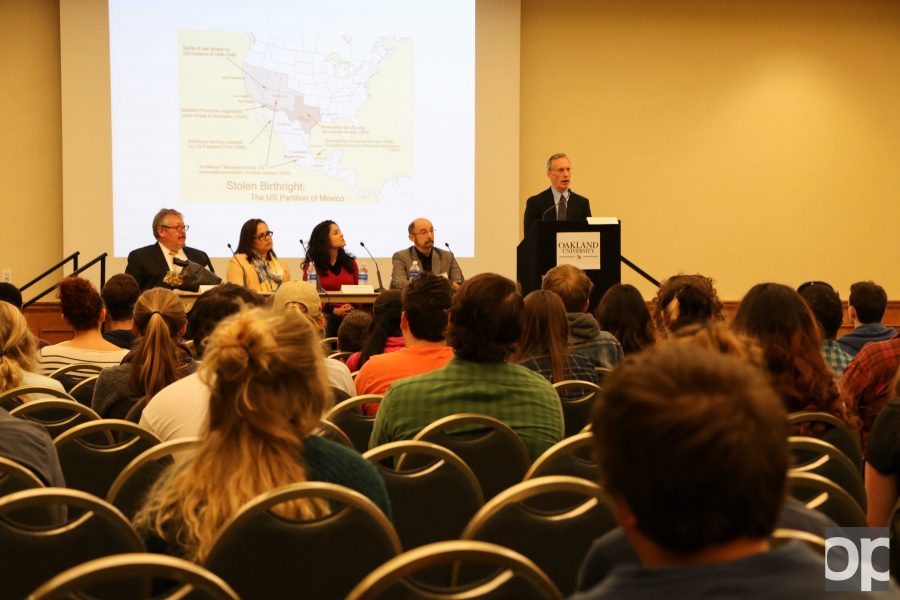Immigration panel held during Hispanic Heritage Month
Oakland University Center for Multicultural Initiatives held an immigration debate on Wednesday, Oct. 12 as part of the Hispanic Celebration Month events.
As part of its Hispanic Heritage Month series, Oakland University held an panel on immigration on Wednesday, Oct. 12 in Banquet Room A of the Oakland Center.
Organized by associate professor of Spanish in the Department of Modern Languages and Literatures Cecilia Saenz-Roby, the panel referred specifically to Hispanic immigrants from countries such as Mexico, Puerto Rico, Cuba and those in Central America.
Panelists included Associate Professor of political science Emmett Lombart, Assistant Professor of political science Diana Orces, Immigration Attorney Mayra Lorenzana Miles and Consul of Mexico Juan Manuel Solana Morales.
Associate Dean of the College of Arts and Sciences Robert Stewart introduced the topic by discussing American immigrants like Alexander Hamilton, Irving Berlin and Audrey Hepburn.
“Who is welcome in this country?” Stewart asked. “Who is not? Can our society be enriched simply by the presence of those outside our borders? This is not just a question of democratic statistics or political policies, but a focus on the word ‘who.’”
Alan Epstein, director of religious studies in political science and moderator of the panel, spoke next. He addressed why immigrants come to the U.S.
“We talk about the pull factors such as economic stability, but we don’t talk about the push factors,” Epstein said.
Epstein explored this point further by stating that the U.S. pushes people to relocate from their native country to America.
He cited examples such as the Spanish-American War, during which the U.S. took control of Puerto Rico, drafted 20,000 Puerto Rican citizens into the American army to serve in WWI and made English the official language of the country. There are now more Puerto Ricans living in the U.S. than in Puerto Rico itself.
Consul Morales, who has served as the consul of Mexico in Detroit since 2013, took a similar position when he discussed violence and the need for security as the main factors in emigration from Mexico.
“This is not a perception, but a reality,” Morales said. “If you’re not the victim of a crime, you may be forced to take part in one. It can be a matter of, if you don’t leave tomorrow, you could die.”
Morales then moved on to the pull of economic opportunity and challenged the audience to try to live (clothe, transport, entertain, feed yourself, etc.) for three days on $1 per day.
Orces, when she took the podium, spoke of what she claimed is U.S. policy to deter immigrants, referring to The Dangers of Awareness Campaign, which states that it is too dangerous for people, with an emphasis on children, to make the trip north.
From the perspective of an immigration attorney, Miles claimed that no matter the intention of the campaign, it would essentially make no difference.
“The only real border or wall you can build is not having enough jobs, because otherwise, immigrants will find a way,” Miles said.
At the end of the panel, Lombart informed the audience that Australia, Canada and Germany each admit a greater number of immigrants than the U.S.






